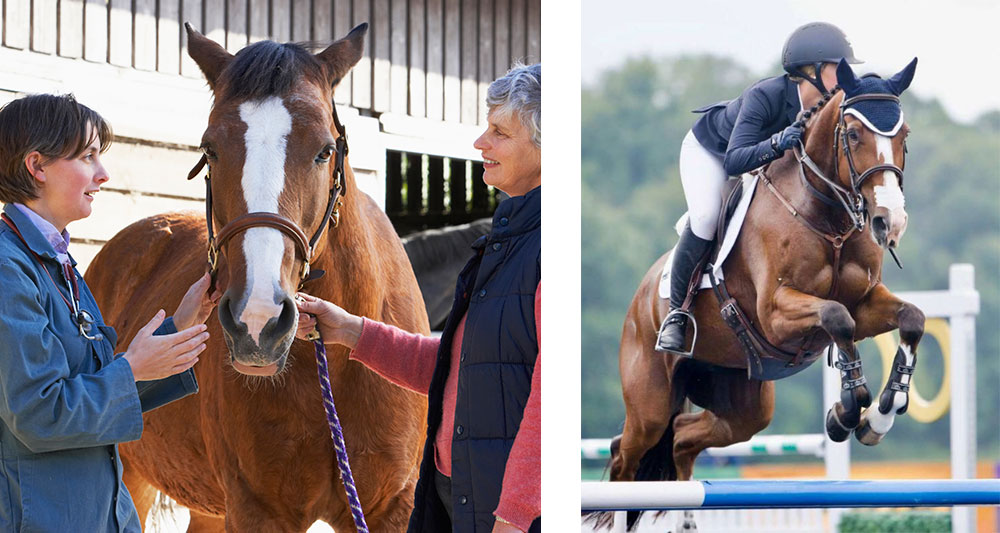
Veterinarians in Kansas
- Back Road Equine Veterinary Practice, 5609 North Oliver St., Kechi, KS 67067
- Countryside Veterinary Clinic, 1002 S Hayes St., Garnett, KS 66032
- Elite Equine Veterinary Services, 10021 N Hillside St., Valley Center, KS 67147
- Equine Surgery & Medicine, 3500 E 45th St. N, Wichita, KS 67220
- Green Valley Veterinary Services, 5210 N Highway 99, Wamego, KS 66547
- Heartland Equine Hospital , 17577 Bayside Dr., P.O. Box 520, Tonganoxie, KS 66086
- Heritage Animal Hospital, 20440 West 183rd Street, Olathe, KS 66062
- Kansas Center for Equine Reproduction (KsCER), 760 N 950th Road, Lawrence, KS 66047
- Kansas State University Equine Medical Center, 1800 Denison Ave., Manhattan, KS 66506
- Meriden Animal Hospital, 7146 K4 Hwy., Meriden, KS 66512
- Stone Horse Veterinary Services, P.O. Box 442195, Lawrence, KS 66044
- Strain Equine Services LLC, P.O. Box 345, Bonner Springs, KS 66012-0345
- Sunflower Equine Veterinary Clinic, 21105 Nall Ave., Bucyrus, KS 66013
- TimberCreek Veterinary Hospital, 9000 Elk Creek Road, Manhattan, KS 66502
- Town & Country Equine & Pet Hospital, 27965 Beaver Creek Road, Louisburg, KS 66053
- Western Prairie Equine Service, 1380 Toulon Ave #B, Hays, KS 67601
- Wichita Equine & Butler County Veterinary Service, 167 SE 100th St., Leon, KS 67074
When looking for a horse veterinarian, prioritize their experience with horses, relevant certifications, good horse handling skills, a confident and calm demeanor, access to specialists for complex cases, a clear communication style, and positive recommendations from other horse owners in your area; also consider their availability, practice setup, and pricing structure to ensure they fit your needs.
Key qualities
Equine specific expertise: Ensure the vet has significant experience treating horses, as equine medicine differs from other animal practices.
Relevant certifications: Check if the vet holds certifications from organizations like the American Association of Equine Practitioners (AAEP) or has additional specialties like lameness, dentistry, or reproduction.
Good horse handling skills: A skilled vet should be comfortable and confident around horses, handling them calmly during procedures.
Communication skills: Choose a vet who explains diagnoses and treatment plans clearly and answers your questions thoroughly.
Access to specialists: Consider if the vet has a network of specialists they can refer to for complex cases.
Reputation and referrals: Ask other horse owners in your area for recommendations about the vet's competence and reliability.
Other factors to consider
Practice setup: Decide if you prefer a solo practitioner or a larger clinic with multiple vets depending on your needs.
Availability: Check the vet's practice hours and on-call availability for emergencies.
Cost and pricing structure: Inquire about the vet's fees for routine procedures and potential treatments to ensure they fit your budget.
Facility and equipment: Evaluate the vet clinic's facilities, including the availability of necessary diagnostic tools and equipment.
An equine veterinarian is a veterinarian who specializes in the care of horses. They are trained to diagnose and treat a wide range of horse health problems, including:
- Lameness
- Digestive problems
- Respiratory problems
- Reproductive problems
- Infectious diseases
- Neurological disorders
- Surgical conditions
Equine veterinarians also play a role in preventive care for horses, such as vaccinations, deworming, and dental care.
Equine veterinarians are different from small animal veterinarians in a number of ways. First, equine veterinarians must have a strong understanding of horse anatomy and physiology. Horses are large animals, and their anatomy and physiology are different from those of small animals such as cats and dogs.
Second, equine veterinarians must be able to work with horses in a variety of settings, including farms, racetracks, and horse shows. This requires them to be able to handle horses safely and effectively.
Finally, equine veterinarians must be familiar with a wide range of horse breeds and disciplines. This is because different breeds of horses are prone to different health problems, and different disciplines place different demands on horses' bodies.
Here are some specific examples of the tasks that an equine veterinarian may perform:
- Perform physical examinations
- Diagnose and treat diseases and injuries
- Perform surgery
- Vaccinate horses
- Deworm horses
- Provide dental care
- Advise horse owners on nutrition and management
Equine veterinarians play an important role in the health and well-being of horses. They provide a wide range of services to help horses stay healthy and perform at their best.
Here are some of the key differences between equine veterinarians and small animal veterinarians:
- Species: Equine veterinarians specialize in the care of horses, while small animal veterinarians specialize in the care of cats and dogs.
- Anatomy and physiology: Horses are large animals with anatomy and physiology that is different from that of small animals. Equine veterinarians must have a strong understanding of horse anatomy and physiology in order to provide effective care.
- Work environment: Equine veterinarians often work in a variety of settings, such as farms, racetracks, and horse shows. Small animal veterinarians typically work in veterinary clinics or hospitals.
- Breeds and disciplines: Equine veterinarians must be familiar with a wide range of horse breeds and disciplines. Small animal veterinarians typically focus on a smaller range of breeds and disciplines.
Overall, equine veterinarians and small animal veterinarians play important roles in the health and well-being of animals. They are both highly skilled and knowledgeable professionals who are dedicated to providing the best possible care to their patients.
You can find more informative articles in our section on Health & Education. While you're here be sure to check out our Curated Amazon Store.

































